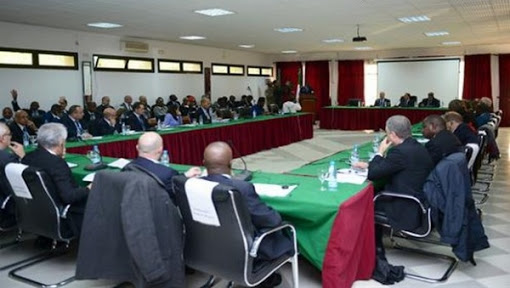National Workshop On Addressing…

National Workshop On Addressing The Root Causes Of Violent Extremism
The National Defence College Abuja and the African Centre for Study and Research on Terrorism, Algiers with the support of the Office of the National Security Adviser (ONSA) will be hosting a National Workshop on Addressing the Root Causes of Violent Extremism at the National Defence College Abuja from 8-9 December 2016. This workshop is part of a series that the ACSRT is organising in African Union member states.
Nature of Workshop
The workshops will feature plenary sessions that will help provide participants with a broader understanding of the subject matter, the preventive measures and mechanism for Countering Terrorism threat and violent extremism, the associated problems, the legal and administrative safeguards in the concerned countries and look how well they stand up to the challenges posed by the ever-changing and adapting nature of the terrorist threat and violent extremism. Furthermore, discussions will also centre on the best methods for addressing these challenges. Smaller, more focused discussion groups will assess the current status of counterterrorism and countering violent extremism efforts in the country, as well as the strategies for enhanced cooperation to meet the challenges posed by terrorism and extremism.
Participants
The workshop will attract over 50 participants from various Ministries, Departments and Agencies (MDAs). Participants will also be drawn from the civil society, media, community leaders, women and youth groups, religious organisations among others. This is borne from the realisation that preventing and countering violent extremism requires a whole of society participation involving the citizens, state and various international partners.
Objectives: The main objectives of the workshop are outlined below:
- a.Provide an opportunity for the relevant government and civil society actors discuss the concepts of radicalization, fundamentalism and violent extremism; share experiences;
- Provide an ideal context to discuss an innovative approach, based on human security, to prevent and counter violent extremism, which in addition to the law enforcement actions, would enable them to build a more comprehensive and sustainable response to the continuously and impetuously developing violent extremism threat.
- Identify the targets of indoctrination and radicalization and establish the major guidelines of an analysis or diagnosis grid for radical and extremist discourse and teachings appealing to violence;
- Review the existing legal tools and mechanisms at the national, regional and international levels to identify gaps that need to be filled and challenges to overcome, as well as good practices and lessons learnt to share to enhance the response to violent extremism;
- Identify measures to overcome the misuse of religion as well as political, ideological, socio-economical, ethnical and other grievances, as well as other tactics used by “brainwashers”, as a justification for violent extremism;
- Identify the roles of respective actors at the national, regional and international levels in the prevention and the countering of violent extremism.
- Identify possible actions to be urgently implemented to prevent violent extremism;
- Address key issues and challenges relating to the promotion of mutual cooperation, peaceful co-existence and inclusiveness in countering violent extremism.
- Identify measures to be implemented to ensure the coordinated action of Member States at the regional level and the full compliance of their actions with those implemented by the neighbouring RECs as well as by AU, UN and other international and regional bodies.
Enquiries:
Dr C. Nna-Emeka Okereke fdc





